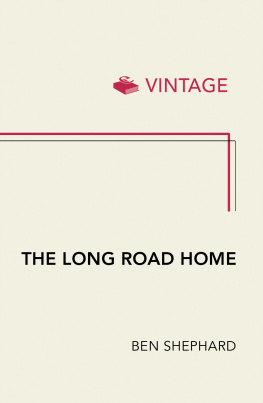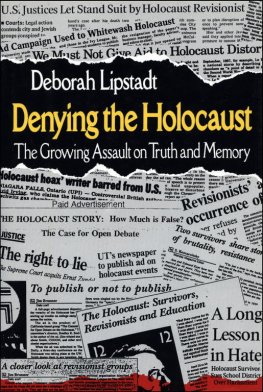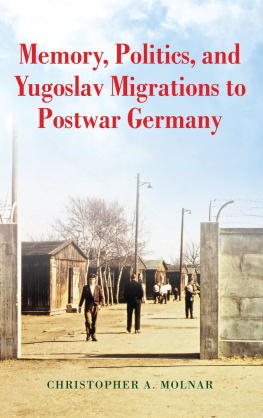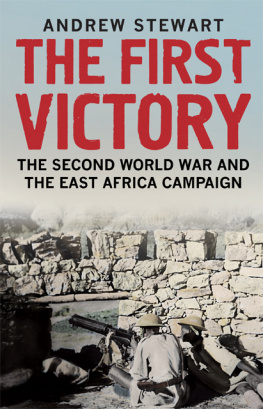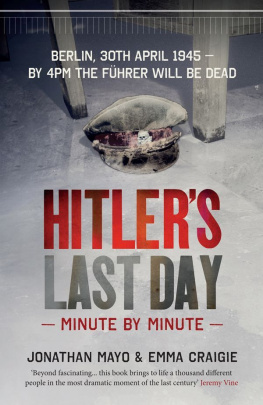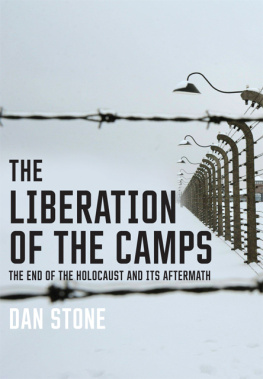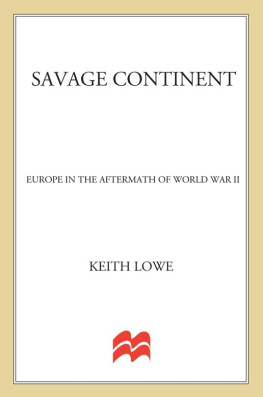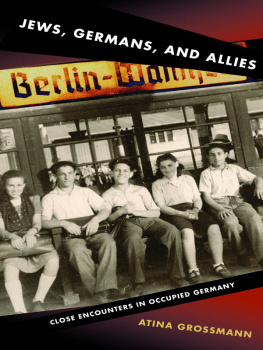Abbreviations Used in the Notes
AP | S. Armstrong-Reid and E. Murray, Armies of Peace. Canada and the UNRRA Years (Toronto, 2008) |
ASH | L. Dinnerstein, America and the Survivors of the Holocaust (New York, 1982) |
BC 2003 | J-D. Steinert and I. Weber-Newth (eds), Beyond Camps and Forced Labour. Current International Research on Survivors of Nazi Persecution. Proceedings of the International Conference, London, January 2931 2003 (Osnabrck, 2005) |
BC 2006 | J-D. Steinert and I. Weber-Newth (eds), Beyond Camps and Forced Labour. Current International Research on Survivors of Nazi Persecution. Proceedings of the International Conference, London, January 1113 2006 (Osnabrck, 2008) |
CAMGCOP | F. S. V. Donnison, Civil Affairs and Military Government. Central Organisation and Planning (1966) |
CAMGNWE | F. S. V. Donnison, Civil Affairs and Military Government. North West Europe, 194446 (1961) |
DBPO | M. E. Pelly et al. (eds), Documents on British Policy Overseas. Series I, Volume V. Germany and Western Europe. 11 August31 December 1945 (1990) |
Series I, Volume VI. Eastern Europe. August 1945April 1946 (1991) |
FRUS | Foreign Relations of the United States 19421950 (Washington, DC, 196778) |
HEAEG | S. Thernstrom et al. (eds), Harvard Encyclopedia of American Ethnic Groups (Cambridge, Mass., 1980) |
HFW | U. Herbert, Hitlers Foreign Workers. Enforced Foreign Labour in Germany under the Third Reich (Cambridge, 1997) |
HST/OT | Harry S. Truman Library. Oral testimony |
IWM | Imperial War Museum |
KHL | Letters and Papers of Kathryn C. Hulme, Beinecke Rare Book and Manuscript Library, Yale University |
LR | M. Z. Rosensaft (ed.), Life Reborn. Jewish Displaced Persons 19451951 (Washington, DC, 2001) |
NPA | National Planning Association, Washington, DC |
NYT | New York Times |
ODNB | Oxford Dictionary of National Biography |
PCW | Polish Camp Wildflecken Report by Kathryn C. Hulme. June 1947. UNA: S1021 Box 81 File 1 |
TNA | The National Archives, Kew, London |
UC | Kathryn C. Hulme, Undiscovered Country. The Search for Gurdjieff (1966; Lexington, Ky., 1997) |
UD | Sir Frederick Morgan, UNRRA Diary, Imperial War Museum |
UNA | United Nations Archive, New York. |
USHMM | Unites States Holocaust Memorial Museum, Washington, DC |
Woodbridge | UNRRA. The History of the United Nations Relief and Rehabilitation Administration, 3 vols (New York, 1950) |
WP | Kathryn C. Hulme, The Wild Place (Boston, 1954) |
About the Author
Ben Shephard was born in 1948 and read history at Oxford University. He was a producer on the television series The World at War and The Nuclear Age and has made numerous historical and scientific documentaries for the BBC and Channel Four. He is the author of the critically acclaimed A War of Nerves: Soldiers and Psychiatrists 19141994 and After Daybreak: The Liberation of Belsen, 1945. He lives in Bristol.
About the Book
After the Great War, the millions killed on the battlefields were eclipsed by the millions more civilians carried off by disease and starvation when the conflict was over. Haunted by memories, the Allies were determined that the end of the Second World War would not be followed by a similar disaster, and they began to lay plans long before victory was assured.
Confronted by an entire continent starving and uprooted, Allied planners devised strategies to help all displaced persons, and repatriate the fifteen million people who had been deprived of their homes and in many cases forced to work for the Germans. But over a million Jews, Poles, Ukrainians, Latvians, Lithuanians, Estonians and Yugoslavs refused to go home.
This book offers a radical reassessment of the aftermath of World War II. Unlike most recent writing about the 1940s, it assesses the events and personalities of that decade in terms of contemporary standards and values. This is the true and epic story of how millions ultimately found relief, reconciliation and a place to call home.
Acknowledgements
Excerpts from The Wild Place and Undiscovered Country, both by Kathryn C. Hulme, and excerpts from the unpublished letters of Kathryn C. Hulme are reprinted with the permission of Edward Denny Jr., and Lynda Garebedian.
Six lines from Dont Lets Be Beastly to the Germans by Noel Coward are quoted with the permission of Methuen Drama, an imprint of A&C Black, Publishers Ltd. My grateful thanks to Jake Arnold-Forster for the extended loan of his grandfathers papers; to Colonel Rupert Prichard, OBE, for permission to quote from the papers of Sir Frederick Morgan; and to Dr Yair Grinberg for corresponding with me. It has been a pleasure to get to know Menachem Rosensaft. Pictures have been provided by the American Friends Service Committee: 11; Beinecke Library, Yale University: 9; Getty Images: 16, 8, 13, 14; NIOD: 12; United Nations Archives: 7; United States Holocaust Memorial Museum: 10; and US National Archives: 15. Every effort has been made to trace copyright holders. The author and publishers will be pleased to correct any mistakes or omissions in future editions.
My debt to other scholars is substantial. Mark Mazower provided initial encouragement. Jair Kessler and Tony Judt awarded me Visiting Research Fellowships at the Remarque Institute, New York University. The Beinecke Library at Yale University granted me a Donald C. Gallup Fellowship; my thanks especially to Barbara A. Shailor. Jessica Reinisch invited me into the Birkbeck fold and has been a stalwart friend. Brian Bond, Allan Young, and Jos Brunner gave me the chance to try out my ideas. Matthew Frank, Nick Stargardt and Alex Clarkson generously shared their research. My old comrades-in-arms, Raye Farr and Martin Smith, have been patient listeners. Some parts of appeared in the Journal of Contemporary History. I alone am responsible for the final product.
For generous help, I also thank Nick Baron, Yehuda Bauer, Danny Cohen, Marta Dyczok, Peter Gatrell, Josef Grodzinsky, Anna Jaroszyska-Kirchmann, Zeev Mankowitz, Hans-Dieter Steinert, Reiner Schulze, Tomas Venclova, Paul Weindling and Tara Zahra.
I am indebted to the librarians and staff of the United Nations Archives, Imperial War Museum (especially Rod Suddaby and the Department of Documents), the Wiener Library, British Library, the National Archives, London, the United States Holocaust Memorial Museum, Yale University libraries, the London Library, Bristol University Library, Colombia University Library, the Bodleian and Rothermere Libraries, Oxford, and New York University.
Next page
